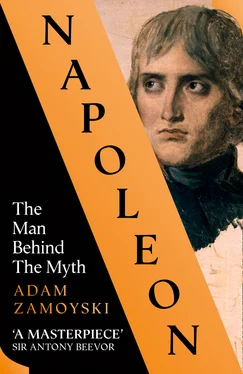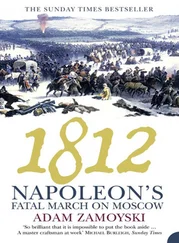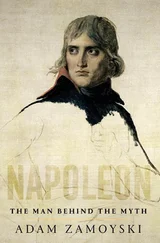The Directory sent Saliceti to Nice to investigate. He reported that the Army of Italy was not only lacking in all the necessities, it was suffering from low morale, due largely to Scherer’s poor leadership. At the suggestion of Barras, the head of the Directory, Carnot, appointed Buonaparte to succeed him. Carnot regarded the Italian theatre of operations as secondary, and supposed that this ‘little captain’, as he referred to him, would be up to the limited task. The appointment nevertheless raised eyebrows, as Buonaparte had never commanded a unit, let alone an army in the field, and had never been in a real battle. There were plenty of experienced generals to choose from who, as some observed, were not treacherous Corsicans.22
Buonaparte set to his new task with his characteristic sense of purpose. He bought all the maps and books on Italy he could find and shut himself up for a week in his office reading, lying on his stomach on maps spread on the floor and tracing possible routes and lines of advance. On the afternoon of 8 March he met Josephine at the offices of her notary Raguideau to draw up their marriage contract and sign a séparation de biens , a prenuptial agreement, after which they parted and spent the night apart (Barras claims she spent it with him). Buonaparte almost certainly worked through the night, and did not emerge from his offices until that night of 9 March, when he remembered, two hours late, an important appointment.23
At ten o’clock he drove across a Paris thickly carpeted in snow, accompanied by his aide Jean Le Marois, to the offices of the deuxième municipalité of Paris, housed in the former residence of an émigré marquis, situated in the rue d’Antin. Josephine had been waiting for him there for two hours, along with Barras, Jean-Lambert Tallien, now a member of the legislative chamber, and her lawyer Étienne Calmelet, who were to witness their marriage. The man who was to marry them, the officier de l’état civil Carles Leclercq, had grown tired of waiting and gone home to bed, leaving a minor functionary to act in his stead.
The resulting marriage was invalid. The functionary in question had no authority to marry anyone; Buonaparte’s witness Le Marois was under the required age of twenty-one; and the documents provided by both parties were spurious: pleading the impossibility of providing a birth certificate due to the British blockade of Martinique, Josephine produced a document drawn up by her notary attesting that she had been born on the island in 1767, four years after her real date of birth, while Buonaparte, using the same argument, produced a similar one giving his date of birth as 5 February 1768 (the day Corsica became French).24
After the ceremony, without so much as a celebratory drink, the participants went home singly, except for the newlyweds. But their wedding night was not a success, as Josephine’s pet pug, Fortuné, would not let Buonaparte get into her bed, and bit him in the calf when he tried. The next day he accompanied her to Madame Campan’s school at Saint-Germain-en-Laye to visit Hortense. That night he may have had access to his spouse, but by the following evening he was on his way south, travelling by night in the company of Junot and the commissary Félix Chauvet. Wisely, he had opted to have his own men running the supply services, and he trusted Chauvet, who was an old friend of the family from Marseille and had served him at Toulon. After much begging he had also persuaded Jean-Pierre Collot, an efficient victualler, to come with him.25
They went by way of Marseille, where Buonaparte had a serious matter to attend to. He had not asked his mother for permission to marry, a mark of disrespect and a sin against Corsican family lore, nor had he informed any of his siblings of the forthcoming event – with good reason. He knew that Josephine did not conform to their idea of a desirable wife or a useful addition to the family. She came from an alien milieu, and not only did she not bring any money with her, her interests and those of her children were bound to conflict with those of the Buonaparte. He had himself berated Lucien for his marriage to the lowly Christine Boyer, and more recently had ruled out allowing Paulette to marry the waning Fréron. Lucien, who knew Josephine and disliked her, would no doubt have enjoyed alerting Letizia to his brother’s mésalliance . On reaching Marseille, Buonaparte apprised Letizia of his marriage and delivered a fittingly deferential letter from Josephine. She took some persuasion, and consulted Joseph before grudgingly responding with a letter whose text Buonaparte had prepared in advance.26
He did not call on Désirée, now back in Marseille, but she heard his news and wrote him a suitably heartbroken and melodramatic letter: ‘You have made me miserable for the rest of my life, and yet I still have the heart to forgive you. My life is a horrible torture for me since I can no longer devote it to you … You, Married! I cannot accustom myself to the idea, it is killing me, I cannot survive it.’ She ended by assuring him that she would never marry another.27
Her letter might have moved the ‘Clisson’ of a few months earlier, but now Buonaparte had thoughts only for Josephine. ‘Every instant takes me further away from you, my adorable love, and with every instant I find less and less strength with which to bear being away from you,’ he wrote as he sped south two days after leaving her in Paris. ‘You are the constant object of all my thoughts,’ he assured her, wishing he could be back reading ‘our wonderful Ossian’ together. It is the first extant document he signed ‘Bonaparte’.28
When he reached the headquarters of the Army of Italy at Nice on 26 March 1796, the twenty-six-year-old Bonaparte faced one of the greatest challenges of his life. He had never held independent command of so much as a platoon in the field, yet he was now commander-in-chief of an army, staffed with men older and more experienced than him, with sound reputations. Such was André Masséna, eleven years his senior, a big, tall man with expansive gestures and an ironic, malicious smile, the son of a petty grocer from Nice who had been orphaned early and run away to sea, then joined the royal army in which he rose as high as a plebeian could, before, after a spell as a smuggler, fighting his way to general’s rank in the army of the Republic. He was a force of nature, uneducated, ostentatiously brave, determined and effective in battle, displaying tactical flair – and a piratical lust for treasure. Another was Charles-Pierre Augereau, twelve years older than Bonaparte, the son of a servant and a Parisian fruit-seller who had a long career behind him as a mercenary in the Neapolitan and Prussian armies before rising in that of the Republic by his conspicuous bravery. He too was a tall, martial figure, with a big nose, the blustering demeanour of a bully and the subversive attitude of a proletarian revolutionary. Foul-mouthed and violent, this child of the streets was popular with his men. The only thing the third corps commander shared with the others was a massive physique. Jean-Mathieu Sérurier was an educated fifty-three-year-old minor nobleman and veteran of the royal army who had seen action in the Seven Years’ War, a conscientious, steady, brave and efficient general.
Unlike regular armies, in which a man’s rank is taken as a mark of his worth, in the armies of the Republic officers and men learned to trust and esteem only those with a reputation bestowed by those who served under them and spread by word of mouth. Masséna had come across Bonaparte at the siege of Toulon, but was unaware of his contribution to the fall of the town, and to him and the other officers in the Army of Italy, its new commander was an unknown quantity. But they did know he had taken part in the events of Vendémiaire and that he was a political appointment, a ‘Parisian general’ and an ‘intriguer’ with no substance, in the words of another who had come across him at Toulon, chef de bataillon Louis-Gabriel Suchet. They had been expecting the worst, but when they actually saw the man they despaired. In their eyes his diminutive stature, pathetic appearance, awkward manner and rasping voice ruled him out as an effective leader of men.1
Читать дальше












